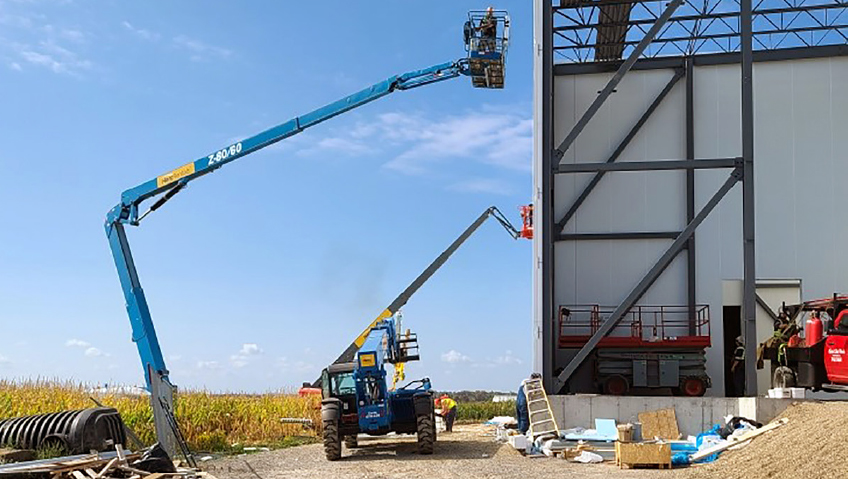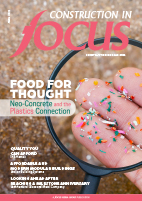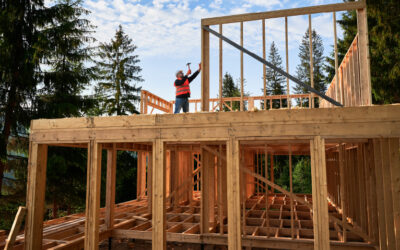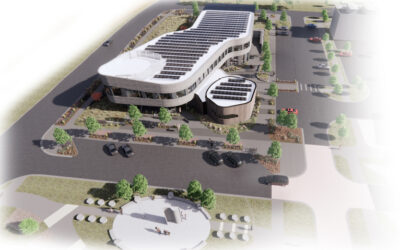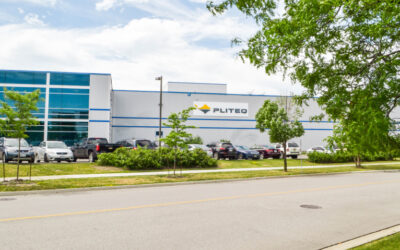A leader in Canadian construction, family-owned Structural Panels Inc. (SPI) has a rich history as a top supplier of structural insulated panels to construction companies, architects, designers, contractors and specialty builders. This year, it is celebrating its 35th anniversary with expansion and a new partnership.
“It’s pretty impressive that we’re still around after 35 years,” says Business Development Manager Lee Rogers of the Baltimore, Ontario location. “There are not a lot of companies like that, especially in a small town.”
Rogers’ brother started working for SPI about 15 years ago, and when their father — who founded the company — passed away 10 years ago, Rogers moved back from Halifax to help run the business, which now has a staff of between 18 and 22.
SPI’s custom-made panels — available in a wide range of core thicknesses and colours — have been successfully integrated into numerous industrial, commercial, and residential projects across the country. The expanded polystyrene (EPS) core Rockwall and Isowall panels — the company’s two flagships — are especially effective within industries that need clean rooms, high wash-down areas, fire resistance and controlled temperature rooms.
Other available products include a complete range of complementary associated and accessory materials.
Rogers explains that if a fire were to break out in a building, Rockwall panels can supply up to three hours of fire safety, basically allowing time to clear the building of workers before the fire starts to come through and threaten the walls.
“The insurance companies are into it, especially when you’re building a chemical factory close to a neighbourhood or a school for instance. Rockwall provides walls that are fire-rated up to three hours and people in the neighbourhood can be told that in case of an accident.”
SPI has also branched out into areas of business looking to control energy costs, such as putting up dividers in a large space in order to accommodate multiple tenants. The panels are steel on both sides, and both Rockwall and Isowall have the same amount of R-value (thermal resistance) and both are very good at controlling temperature.
“We got our start in freezers and coolers, which is where our panels were best suited at the beginning,” says Rogers. “After that we branched out into warehouses, storage facilities, and food processing areas. All of our panels are food-grade, so you can build a fish hatchery, you can build a potato farm and have a potato storage area, and you can basically process any food or ingredient of any kind with no cross contamination or concerns of any kind for mould. So that’s very exciting.”
The last couple of years Structural Panels has moved into the cannabis industry as well, as the panels allow for the separation of a large area into smaller growing rooms and flowering rooms and mother rooms, and different sorting areas while still preventing cross contamination of plants.
“They all need special lighting and care and separation from everywhere else. They’re not hermetically sealed, but there’s a lot of protocol around walking from room to room and not accidentally taking seeds from one place to another and accidentally cross-pollinating. So our panels have been very adept at that.”
As with every company, the ongoing pandemic has created its own set of unique challenges and opportunities for Structural Panels.
“The COVID situation has obviously been a lot for most people,” he says. “We’ve stayed busy through most of that. In the first wave we were essential because what we were supplying was a lot of medical laboratories in addition to food. Those are both prominent areas and we were allowed to keep going. We can’t make panels at home!”
In the meantime, the company is waiting to see what the still uncertain future brings.
“We’re kind of waiting to see what happens when the world resumes and how people are going to treat working spaces, the kinds of partitions they might need,” says Rogers. “We don’t have a magic panel that cures COVID and we don’t want to accidentally say that or make any promises that way. But our panels are hygienic, they’re easy to clean, you can sanitize them a thousand times and the paint won’t come off them. They’re very structurally sound and they’re going to keep germs locked away the same as they help control regular air flow.”
Rogers also thinks the panels are a good choice for mobile workstations, portable booths that can be wheeled within an office setting when looking to keep co-workers separated from one another, similar to the plastic dividers used now.
“Are the plastic separators going to turn into more permanent separators to keep people away from each other? Is this our life now?” says Rogers. “We’re riding that wave now and waiting to see how we can be helpful and provide panels to people who are facing those challenges and trying to find an affordable, simple solution that looks good.”
SPI’s panels are white on both sides and look clinical, and while SPI doesn’t make any false claims that they’re able to control COVID beyond what anyone else is doing, they are beneficial, and definitely a wise choice to consider, especially in the food and health grade, says Rogers.
Although SPI worked with a media company for two or three years, getting the company’s name out there and helping people to connect with them, COVID hampered SPI’s ability to attend trade shows and expand their brand.
“We have tried hard to make sure that we’re findable. We’ve made sure we’re communicative, made sure that people can call here, talk to somebody right away and get the answers they need,” says Rogers.
He adds that SPI has continually focused on customer service, providing clients the prices they want in time frames that they need. “We have a very small business model. We don’t even have extensions here – you just phone and ask for a person and talk to them as many times as you want.”
Customer service remains key no matter what. When it comes time for orders to be made, SPI can tell clients the exact timeline, which is greatly appreciated.
“We’ve heard feedback from some of the bigger companies that a lot of times there’s a disconnect with customer service, with people not getting what they need. We keep it really small and easy. People call and say I need these panels in two weeks, and we move things around and say we’ll get you what you need. Whatever time frame they want we can make it work. We do a lot of manual scheduling.”
With clients ranging from one-time to once every few months to steady regulars, they are all paired with a sales person who becomes their dedicated key point, often forging a relationship where they text, email and even talk on the weekends whenever they need.
SPI provides the installation of its panels, but customers can opt out of that service. Some customers want to do it themselves, but when others have no idea what they’re doing, SPI will send a team to put the panels up for them.
“We look after the shipping if they want, and we can outsource the engineer drawings if they want,” says Rogers. “We can do full turnkey where we do everything and help them, or we just give them the panels and let them do what they want. There are lots of options.”
Recently SPI has also increased its inventory by adding a third line of panels brought to Ontario via a supplier in B.C. Quickliner is an extruded PVC panel with a glossy finish and interlocking joints along each edge that work to form a barrier between walls and destructive elements such as moisture and harsh chemicals.
“After their panels are shipped to us,” Rogers says, “we store them in our warehouse and distribute them across Ontario and into the East Coast. Their inventory sits on our floor, and we use our platform for the Rockwall and Isowall panels to sell it, because these are complementary products to what we do ourselves.”
Quickliner panels aren’t insulated, don’t have any R-value the way that SPI panels do, and have different applications. In no way a direct competitor to SPI’s products, Quickliner can be used in places where full-on insulated metal building panels aren’t required, such as restaurant dish pits, car washes, or areas where there’s water on concrete but the client doesn’t want to shell out the money on panels and is not looking to control the temperature. And especially if the client just wants to slap something up really quickly.
“It’s very different from what we do but still fits into our family of products really well,” says Rogers.
Although busy with growth and plans for the future, SPI also makes time for charity work whenever possible. Last year the company both donated the insulated panels and paid for professional installers to outfit a local food bank that was moving locations and needed a new freezer and cooler.
“We were able to get that taken care of and do it free. That really helped them out. Now they have a good working facility and we helped feed the folks around town who had problems before COVID and now have problems because of COVID. It was nice to be able to help out.”
SPI modified a room in an old school house into a freezer/cooler space where the food bank could keep some better, healthier food for people. “That was definitely a pretty good highlight for 2020.”

